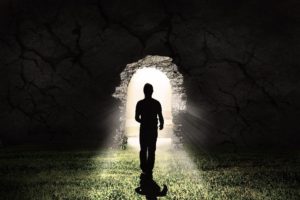Our 20 to 30-somethings are intent on making a difference. We see in recent social media trends that many are willing to make their voices heard, even at the expense of peaceful and respectful conversations. Making the news might get 15 seconds of fame, but if it requires living in the world of grey to be heard, is it worth it? Are these trends because the other generations are not listening? Or is it deeper? Is living in the grey area from time to time worth it to ultimately make a difference for good? Does any means justify the end? Questions of centuries I’m sure, but let me zero in on the topic of living in the “grey” area of life.
One of the most painful observations one can make in life is to look in the mirror and determine the person looking back is in need of course correction—or is not the person we thought them to be. This honest reflection can be embraced, shunned, ignored, or questioned.
Often times these days, while the consideration of course correction is reluctantly contemplated, the person delays any course corrections while living out alter ego lives, totally varnishing the value they esteem the most, authenticity.
How might spiritual leaders and parishioners (both spiritual and/or religious) come together and walk from the grey areas of life into the light? How might this path be lit and embraced by all parties?
Consider 4 keys toward this transformation.
- Agree upon foundational TRUTH. While many of our M’s are taking a path of spirituality without religion, their path usually includes a higher power or creator. Knowing this, and knowing their desire to question deeply the very nature of God, why not challenge an authentic exploration of this dynamic. In a powerful book, Closer than Close by Dave Hickman, his challenge to create a UNION with the Almighty is key to establishing closeness to God. He states “the story of God is just as much (if not more so) a story of union, disunion, reunion, and the promise of perfect union.” Millennials more than any other generations value the concept of authentic relationships and desire to associate with tribes that embrace spiritual oneness. This is a big part of being “Holistic.” In their quest to experience Divine consciousness and experience spirituality in their own unique way, a discussion of HOW this awakening might occur should be a welcome one. I would submit that walking from “grey to light” is akin to going from disunion to perfect union—-however that looks in your world. One foundational truth then to begin this process might be: “we all want to establish a union with our God/Creator and experience Divine consciousness.”
- Embrace Prayer and Meditation. I have had the wonderful opportunity of praying with many faith leaders—what a beautiful experience to hear and witness the desires of their hearts. Millennials state that being spiritual is a personal thing, which can indeed include prayer and meditation. They see the truth in all religions and seek unity. I submit that a great unifier for all generations and for both the spiritual and religions (and they are not necessarily mutually exclusive) is to create unity through prayer. In his wonderful curriculum regarding the topic of prayer – Thy Kingdom Come – Chris Folmsbee makes the beautiful point that prayer is not discriminatory at all; it is available to all people regardless of economic status, race, religion—-for everyone.
- Understand the Author of GREY. Who will be the authority on what is grey or not? The Millennials pride themselves on being ethical and living by values that build societal justice—a beautiful thing. Yet, who can vet the social and political establishments for a determination of what is living in the light of day or the shadows of grey? I believe that for every millennial, boomer, X’r, etc., the answer is ONLY YOU (or ONLY ME). In making these determinations, ask ourselves if we are thinking in terms of principles and values that empower, or are we thinking in terms of who is pushing the agenda? Do we push back and ask questions of those we typically agree with or are we accepting a person or groups ideas now, because we have in the past. Are we siding with a group or political agenda regardless of whether or not it is core to our values? Or are we looking at our reflection in the mirror and determining if we are indeed the same person regardless of the conversations that surround us? I believe that if the discovery of light through prayer and meditation (key number two) is practiced, that ultimately, similar answers will come to seeking hearts, and that these answers will lead all seekers to both peace and resolve. Determining that there is indeed a difference between the grey and light will also help us to inculcate the first key, agreeing upon foundational truths.
- MEET on neutral turf. With over 70% of millennials not attending religious organizations anymore, why not invite a discussion of these thoughts over breakfast at a neutral site. Come with open minds and empty stomachs. Leave with appreciation and friendship. In many faith beliefs, God invited the prayerful participant to engage in dialogue—often over a meal and usually in a neutral location (on a mountain for example). In the dialogue of grey vs light, it’s healthy to invite prayer before the discussion, listen more than talk, and encourage more than judge.
Of all of the classes we offer and teach on several different continents in Launching Leaders, the idea of congruency bubbles to the top of concerns for Millennials and indeed all generations. Congruence is naturally interwoven into the discussion of “grey” as incongruence is filled with grey. We live in a world that declares everything is good (it’s all good), which means nothing is grey; that living a fully non-judgmental life makes us a better person. This concept flies in the face of even having a reason to live ethics and values. While being non-judgmental is a great trait, there are necessarily some aspects of living that require good judgement. Our students (of many faiths) have unanimously determined that a congruent life is much more holistic and abundant. They have told us how much better it is to become truly authentic by being the same person in all aspects of life, and in doing so, living the ethics and values they espouse. The truth is it’s not “all good.” There is a NEED to prayerfully consider what shades of grey we can dismiss as we live a life in the light. The emptiness, confusion, and lack of peace that the grey life brings are in total contrast to the bright and transformative life possible.
In summary then, let’s have a discussion about the “grey” areas of life. Let’s agree on foundational truth, invoke prayer and meditation in our discovery, understand that only WE can determine the “grey” in our lives, and meet over some good food in at a neutral site to form alliances of light.






